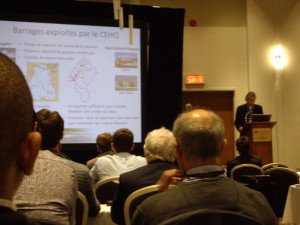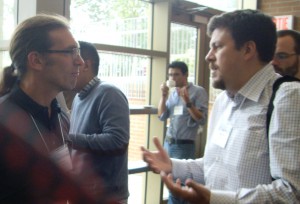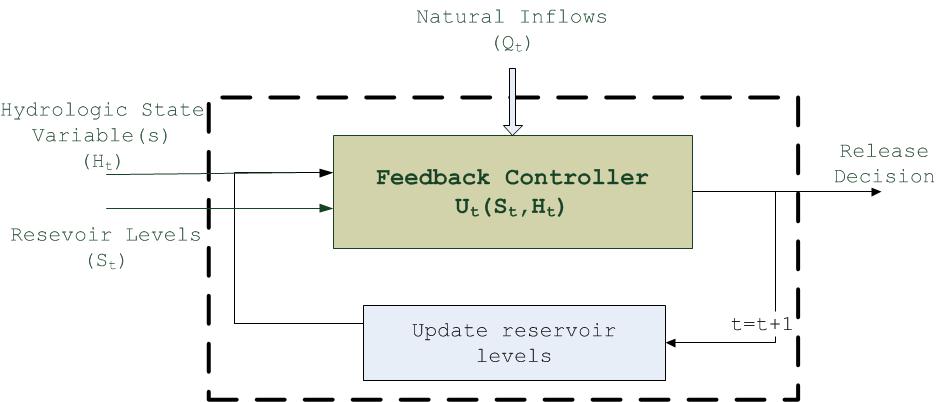From operational hydrological forecast to reservoir management optimization
Contributed by Marie-Amélie Boucher
The interaction between end-users and researchers has long been a central preoccupation of the HEPEX community (see, for instance, this post and this announcement).
 The recent workshop on operational hydrological forecasting and reservoir management optimisation that was held in Quebec City, from September 17-19, aimed at bringing hydrologists and operational researchers together to discuss their most recent findings and future orientations.
The recent workshop on operational hydrological forecasting and reservoir management optimisation that was held in Quebec City, from September 17-19, aimed at bringing hydrologists and operational researchers together to discuss their most recent findings and future orientations.
Scientifically speaking, the link between operational research and hydrology is straightforward: hydrological forecasts are needed as inputs for the optimization model… Or are they, really?
Recent results presented by invited speaker Andrea Castelletti show that hydroclimatic observations could be used successfully to optimize water management decisions, without any need for hydrological forecasts. In addition, many presenters, among which the invited speaker Jerry Stedinger, showed that a careful selection of a subset of ensemble members could be just as useful for reservoir operation optimization as the full ensemble.
Still (fortunately!), in many applications, hydrological forecasts for the state variables are useful inputs to the optimization model. In stochastic optimization, they are used to calibrate the « feedback controller »:
In practice, however, the communication between meteorologists, hydrologists and operational researchers could be improved. One important point that was raised during the closing panel of the workshop is the need for operational researchers to know more about the confidence they should (or should not) have in the hydrological forecasts. Scores and various performance assessment metrics can only do so much for a comprehensive description of the confidence operational researchers should place into the forecasts they receive.
 Good old fashioned discussions between the specialists from both fields should be encouraged, and this was precisely the goal of this workshop.
Good old fashioned discussions between the specialists from both fields should be encouraged, and this was precisely the goal of this workshop.
Among the other « hot topics » addressed during this workshop is the importance of getting the accurate representation of uncertainty in the forecasts.
It has been emphasized that raw outputs from atmospheric models are almost never reliable and should be pre-processed before being passed on to any hydrological model. Still, it is also recognized that the hydrological model also adds various biases and distortions in the final outputs. In fact, according to recent findings (e.g., Kang et al., 2010; Zalachori et al., 2012; Verkade et al., 2013), the biases in hydrological models could be so important that even with appropriate pre-processing of the precipitation and temperature forecasts, the need for post-processing the streamflow forecasts remains.
Another possible solution is to implement a data assimilation scheme into the hydrological model in order to obtain a better representation of the initial conditions of the watershed. This could reduce (or even cancel?) the need for post-processing of streamflow forecasts.
Still, to be able to estimate the pre/post processing parameters correctly, reforecasts are required. This has been on the hydrological wish list for quite some time and stressed on many occasions (see, for instance, Hamill et al., 2004, 2006). Coincidently, it turns out that Environment Canada took this workshop as an opportunity to announce that they will soon produce reforecasts for years 1995 to present. These reforecasts will be issued with the current global ensemble prediction system (GEPS), only with a simpler initialization scheme and a smaller ensemble size. This will certainly allow for more extensive studies on pre/post processing for hydrological purposes.
If you want to know more about the topics that were discussed during this workshop, you can go to here, where most presentations will be made available next week.
References:
Hamill, T. M., J. S. Whitaker, and X. Wei, 2004: Ensemble re-forecasting: Improving medium range forecast skill using retrospective forecasts. Mon. Wea. Rev., 132, 1434–1447.
Hamill, T. M., J. S. Whitaker,, and S. L. Mullen, 2006: Reforecasts: An important dataset for improving weather predictions. Bull. Amer. Meteor. Soc., 87, 33–46.
Verkade, J.S., J.D. Brown, P. Reggiani, P. and A.H. Weerts, 2013: Post-Processing ECMWF precipitation and temperature ensemble reforecasts for operational hydrologic forecasting at various spatial scales, Journal of Hydrology, 501, 73–91
Kang, T.H., Y.O. Kim, and I.P. Hong, 2010: Comparison of pre- and post-processors for ensemble streamflow prediction, Atmospheric Science Letters, 11, 153–159.
Zalachori, I., Ramos, M.H., Garçon, R., Mathevet, T., Gailhard, J., 2012: Statistical processing of forecasts for hydrological ensemble prediction: a comparative study of different bias correction strategies. Advances in Science & Research, 8, 135–141.

0 comments